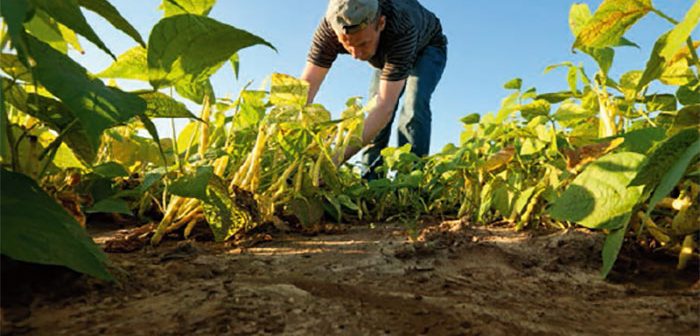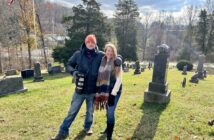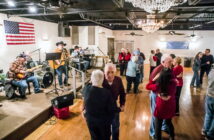A local organic farm welcomes visitors from around the world.
BY JENNIFER MELLACE
If you love to travel and appreciate the benefits of organic farming, then you’ll want to learn more about WWOOFing—Worldwide Opportunities on Organic Farms. WWOOF connects interested travelers from around the world with organic farmers, otherwise known as host farms, to promote education exchanges and build a community of conscious farmers. Available in more than 100 countries around the world, the U.S. currently has more than 2,000 farms, gardens, homesteads, communities, and other agricultural projects signed up to host visitors, otherwise known as WWOOFers. One of those hosts is Ben Mearns, who owns and operates Mud College Farmstead in Gettysburg.
What is WWOOFing?
WWOOFing began in 1971 when a secretary in London, Sue Coppard, wanted to provide access to the countryside to people who may not otherwise have the means or opportunity to experience it. Since then, people eager to learn about farming and support the organic movement have formed and joined WWOOF organizations around the world. “There are WWOOFing opportunities in all 50 states, all year round,” says Samantha Blatteis, membership program manager for WWOOF-USA®. “California and along the West Coast, as well as states like Hawaii and Alaska, are extremely popular.”
WWOOFers spend about half a day helping on a host farm. They learn about the organic movement and sustainable agriculture, and receive room and board during their visit, with no money exchanged between hosts and WWOOFers. The length of stay can range from a few days to a month or longer. One-day local visits are also available. A typical participant in the program has a strong interest in learning and living in a sustainable setting.
“A WWOOFer generally loves the outdoors and wants to contribute to a global, organic food movement,” says Blatteis. “They like people, travel, and have a willingness to pitch in and help out. Many WWOOFers do go on to start their own farms, while others continue a career in agriculture, start their own gardens, join a community garden, stay involved in their local food system, or shop at farmer’s markets.”
A Taste of the Farm Life
Mearns started Mud College Farmstead in 2016 on his grandfather’s dairy farm—the name “Mud College” comes from a nearby historical landmark and craft guild. He chose organic farming for its straightforward, simplistic form. Mearns’ vision is to have the farm be a sustainable and independent community that provides a unique place for growth and peacemaking, where the farm’s inhabitants can thrive and contribute to the local and global human community.
The farm’s connection with WWOOF came naturally. Mearns recognized the value that the organization placed on sustainable farming and its positive impact on the earth. “I learned about WWOOF some 15 years ago when a friend of mine visited a host farm in Italy,” recalls Mearns. “I remembered thinking how neat that was and what a different way to travel. I like how it allowed you to get involved in the farming and food source of the area.”
Prior to becoming involved with WWOOF, Mearns visited a friend’s farm in Oregon, which happened to be a host farm. “I wanted to learn more about what the WWOOFers did when they stayed and get a better idea of what I’d offer as a host farm.” Currently, Mud College Farmstead produces organic fruit, vegetables, and eggs, which are sold at Mearns’ farm stand during the growing season. In addition to produce and eggs, the farm recently invested in goats and hopes to eventually sell milk.
Mearns takes pride in working his own land and finds that his guests share that interest. “I have found that most WWOOFers have a long-term interest in organic farming and cultivating their own land. Others have garden plots or are part of a community garden, and many also love to cook. Ultimately, the entire experience offers participants an affordable opportunity to see the world.”
WWOOFing Your Way Around the World
Most of the WWOOFers who visit Mud College Farmstead tend to be international. Mearns has hosted people from numerous places, including England, Germany, France, Switzerland, and China. A recent guest, 35-year-old Nagore Cia, traveled from her home of Donostia in Spain’s Basque Country. Cia’s initial reason to travel to the U.S. was to improve her English.
“I had been working in audio dubbing, social media, and online marketing,” she says. “I realized that my English needed improvement, and I started looking for ways to practice. I found the WWOOF program and have always wanted to visit the U.S. Becoming a WWOOFer was the cheapest way to travel and a good way to learn the country’s language. It also allowed me to have a good experience on a rural farm.”
Organic farming isn’t as well known in Donostia as it is in the U.S. or other parts of the world. “I think organic farming is very interesting because of its benefits,” Cia says. “It’s true that these farming techniques and this lifestyle is more powerful in the U.S. than it is in Basque Country. It’s easier to find organic products and organic production in the U.S., so this was another reason to visit.”
Cia chose Mud College Farmstead for its location. “WWOOFing in Gettysburg helped me increase my knowledge about U.S. history,” she says. “It’s a charming town that welcomes visitors with open arms. I liked that it was close to some of the big East Coast cities, which made it easier for me to visit them. Actually, I traveled with Ben and his family to Washington, Baltimore, and Philadelphia. It was a very good time.”
Both Mearns and Cia agree that WWOOFing has many benefits and is a great opportunity for people of all ages. “I strongly recommend WWOOFing to other people because it’s a beneficial experience that you will remember forever,” says Cia. “It’s a good way to learn more about an organic farmer’s way of life, to visit a new country, and to learn a foreign language. I tell people who are interested in trying it what another WWOOFer told me—‘You just have to do it!’”
Learn More About WWOOFing
Visit www.wwoofusa.org. There, you can read more about their history, start the process of becoming a WWOOFer or WWOOF host farm, and check out their extensive FAQ section.
To learn more about Mud College Farmstead or schedule a visit, check out the farm’s Facebook page at
facebook.com/mudcollegestead or visit mudcollege.wordpress.com.




